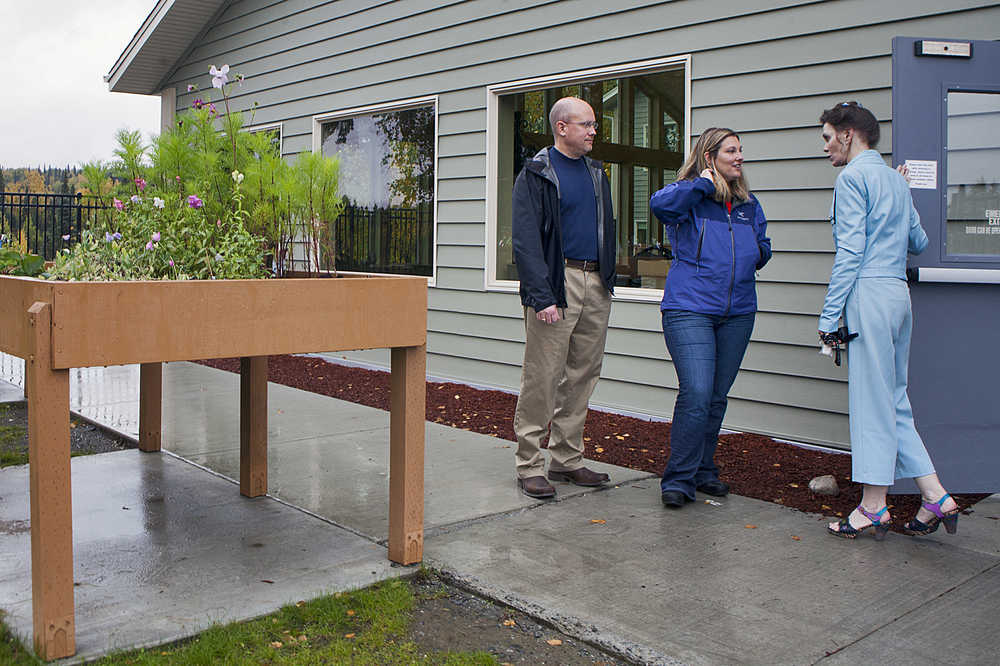Despite the heavy, dark clouds and rain casting a shadow over the Kenai River, the sweeping view from the massive windows in the atrium of the Riverside Assisted Living Home in Soldotna was one of the best in the whole building. Members of Alaska’s Commission on Aging sat in overstuffed chairs and took in the muted light in the room near the end of an hour-long tour of the 50-resident home.
As the group toured the large facility, residents moved in and out of private apartments — some stopping to watch the progression of commission members and senior services workers who peppered Executive Director Sherry Mettler with questions about the space, how it is used, rates and challenges facing privately-owned assisted living facilities in the state.
Mettler showed off apartments facing the river, those facing the street and the building’s salon, cafeteria, reading, and game rooms as she fired off answers to questions about the average age of patients in the facility (85), the number of staff in the building (41), and the staff to patient ratio — typically six patients for every staffer.
The crash course in Kenai Peninsula senior care came during the second day of the 11-member commission’s rural outreach meeting on the Kenai Peninsula. The commission, an advocacy group for seniors, is part of Alaska’s Department of Health and Social Services.
Its members spent the first day of meetings at the Soldotna Senior Center on Tuesday hearing from program coordinators who handle senior services statewide, including the Alaska Mental Health Trust Authority, the state’s Division of Senior & Disability Services and the Alaska Housing Finance Corporation.
The message was clear. Services for Alaska’s seniors are in flux and face budget and logistical challenges statewide.
“The state right now has to figure out if it’s in the people business or the budget business,” said commissioner Bob Sivertsen as he briefed board members on the state-owned assisted living facilities known as Pioneer Homes. Sivertsen, the board’s advisory chair on the homes, said budget pressure is going to take its toll on the six homes operating in the state.
The cuts to the state-run homes amounted to about 8 percent of its budget in 2016, he said. The bulk of the homes’ budgets is in staffing, he said.
“Less staff, less beds. Even with a flat budget scenario, there’s going to be cuts,” he said.
In mid-August, the Department of Health and Social Services also proposed a rate hike for Pioneer Home residents, with the justification that it was an increase to match the Social Security Administration’s cost of living adjustments.
“So what is the fate of our homes? We’ve simply got to adapt to budget cuts,” Sivertsen said. “We’re going to continue to do that until we just can’t keep the doors open. These are options going in the complete opposite direction of what the demographics show us.”
The news wasn’t all bad. Commissioners Marie Darlin and Dave Blacketer introduced a newly-released statewide plan for senior services which is designed as a policy roadmap for senior care. The new plan covers 2016-2019 and is the product of a 19-month process of listening sessions and surveys of the state’s seniors.
Darlin and Blacketer will tackle a funding formula for the plan next, she said.
The commission split into three groups on Wednesday to visit senior service facilities in Nikiski, Kenai, Soldotna, Sterling and Cooper Landing.
Darlin and Blacketer were part of a group that primarily visited larger-sized facilities including the 60-bed Heritage Place nursing home in Soldotna, the 23-unit Northwood Retirement Apartments and Riverside. The group’s lunch break included a session at the Soldotna Senior Center with area support program coordinators.
They heard from people like Amy Hagen, a department director for Frontier Community Services. Several coordinators said the small organizations providing services on the central Kenai Peninsula had found ways to coordinate care and had a solid history of referring seniors for care within the group.
“We get it,” Hagen said. “If we can’t provide the services, we will link (patients) to other community services. We enjoy each other’s resources very much and we probably couldn’t do our jobs without each other.”
Reach Rashah McChesney at rashah.mcchesney@peninsulaclarion.com or follow her on Twitter @litmuslens.

